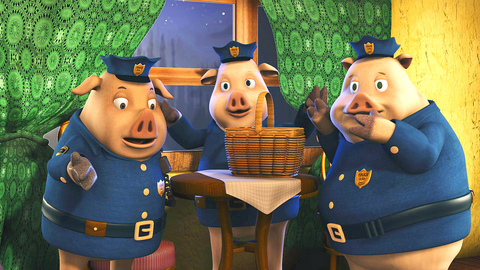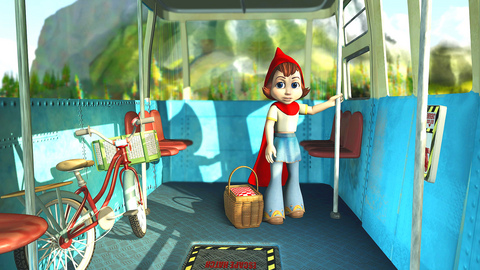Computers and cynicism have conspired to give us Hoodwinked, definitive proof that while classic fairy tales can't be counted on to charm and instruct 21st-century youngsters, the same holds true for their digitally animated deconstructions. Less sassy than shrill, more crass than clever, the maiden cartoon from the Weinstein Company turns the Little Red Riding Hood legend into a sub-Shrek bummer that appears to have been manufactured for the pleasure of tone-deaf kids with a thing for sarcasm, extreme sports, and Andy Dick.
Dick lends his voice to Boingo, a suspiciously perky rabbit caught up in the mystery of what really happened when Red (Anne Hathaway) paid a visit to Granny (Glenn Close) only to find a Wolf (Patrick Warburton) in drag and an ax-wielding Woodsman (Jim Belushi doing Arnold Schwarzenegger) crashing through the window.
Told in a jumble of flashbacks from multiple, improbable and equally unfunny points of view, the story is structured around a police investigation led by a frog detective named Nicky Flippers (David Ogden Stiers), with backup from Chief Grizzly (Xzibit), among other silly creatures. Thus do we learn that Granny leads a secret life as the hard-core snowboarder Triple G, that the Woodsman is a failed actor, and that Wolf is no criminal but an investigative journalist who would rather be a film critic.

PHOTOS COURTESY OF GROUP POWER
All of which may sound totally hilarious to dimwitted marketing executives and people who get a kick out of hearing Close say “fo shizzle.” But with visuals as stale as its writing, Hoodwinked won’t fool anyone else.


Dec. 16 to Dec. 22 Growing up in the 1930s, Huang Lin Yu-feng (黃林玉鳳) often used the “fragrance machine” at Ximen Market (西門市場) so that she could go shopping while smelling nice. The contraption, about the size of a photo booth, sprayed perfume for a coin or two and was one of the trendy bazaar’s cutting-edge features. Known today as the Red House (西門紅樓), the market also boasted the coldest fridges, and offered delivery service late into the night during peak summer hours. The most fashionable goods from Japan, Europe and the US were found here, and it buzzed with activity

These days, CJ Chen (陳崇仁) can be found driving a taxi in and around Hualien. As a way to earn a living, it’s not his first choice. He’d rather be taking tourists to the region’s attractions, but after a 7.4-magnitude earthquake struck the region on April 3, demand for driver-guides collapsed. In the eight months since the quake, the number of overseas tourists visiting Hualien has declined by “at least 90 percent, because most of them come for Taroko Gorge, not for the east coast or the East Longitudinal Valley,” he says. Chen estimates the drop in domestic sightseers after the

US Indo-Pacific Commander Admiral Samuel Paparo, speaking at the Reagan Defense Forum last week, said the US is confident it can defeat the People’s Republic of China (PRC) in the Pacific, though its advantage is shrinking. Paparo warned that the PRC might launch a “war of necessity” even if it thinks it could not win, a wise observation. As I write, the PRC is carrying out naval and air exercises off its coast that are aimed at Taiwan and other nations threatened by PRC expansionism. A local defense official said that China’s military activity on Monday formed two “walls” east

The latest military exercises conducted by the People’s Liberation Army (PLA) last week did not follow the standard Chinese Communist Party (CCP) formula. The US and Taiwan also had different explanations for the war games. Previously the CCP would plan out their large-scale military exercises and wait for an opportunity to dupe the gullible into pinning the blame on someone else for “provoking” Beijing, the most famous being former house speaker Nancy Pelosi’s visit to Taiwan in August 2022. Those military exercises could not possibly have been organized in the short lead time that it was known she was coming.